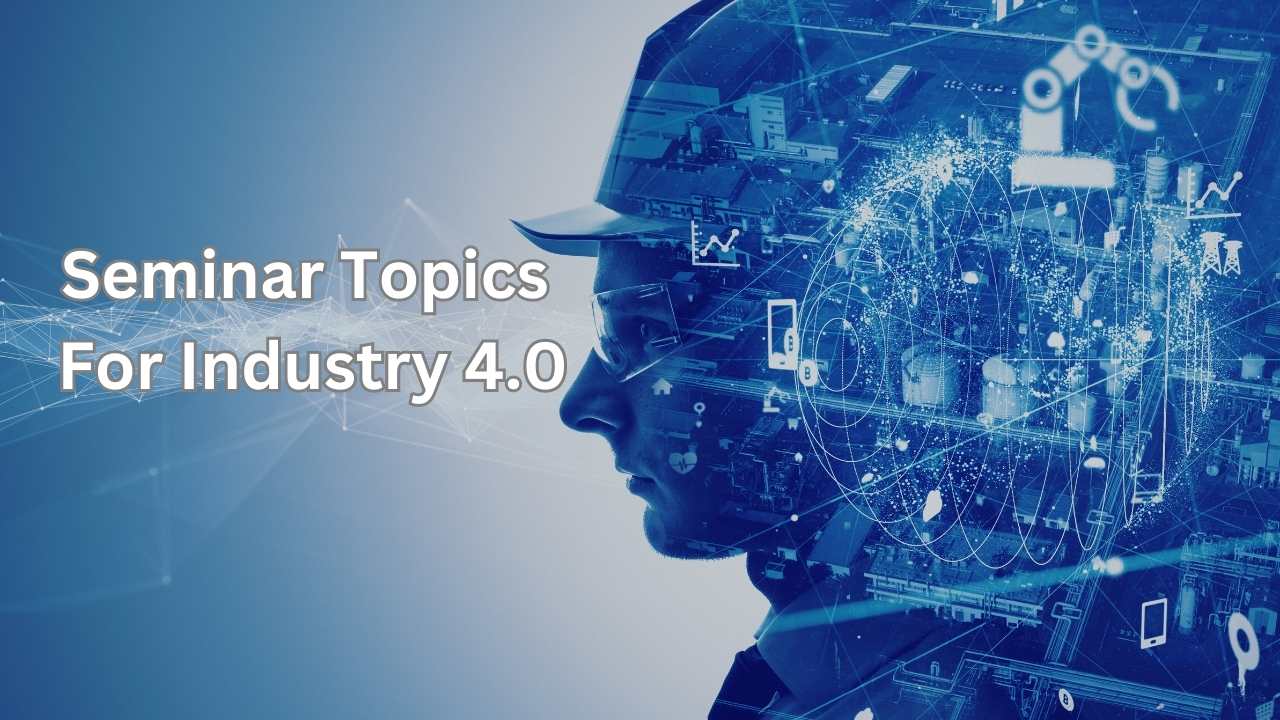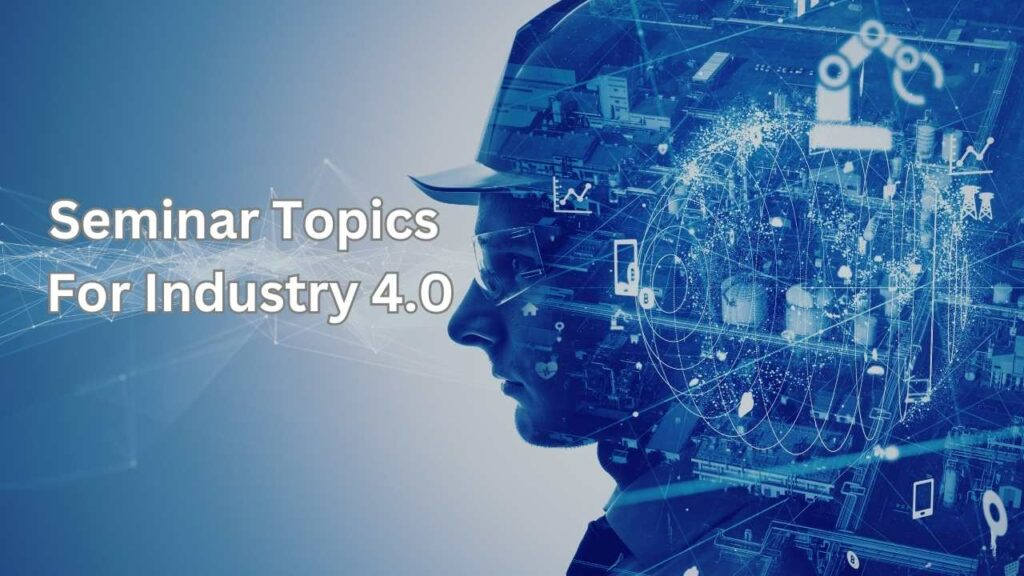
Seminar Topics For Industry 4.0 | Industry 4.0 revolutionizes how companies manufacture, improve, and distribute their products. Manufacturers are increasingly integrating new technologies into their production facilities and throughout their operations, such as the Internet of Things (IoT), cloud computing, and analytics.
Industry 4.0, also known as the Fourth Industrial Revolution, represents the integration of digital technologies into manufacturing and industrial processes. It encompasses automation, data exchange, and cyber-physical systems, enabling the creation of smart factories and intelligent supply chains.
Industry 4.0 is characterized by interconnected devices, real-time data analysis, and the ability to make autonomous decisions. As businesses across the globe embrace this transformation, seminars focusing on Industry 4.0 topics become increasingly relevant.
Contents
- 1 The Role of Artificial Intelligence in Industry 4.0
- 2 IoT Applications in Smart Manufacturing
- 3 Cybersecurity Challenges in the Era of Industry 4.0
- 4 Big Data Analytics and Industry 4.0
- 5 Robotics and Automation in Modern Factories
- 6 Cloud Computing for Industry 4.0
- 7 Augmented Reality and Virtual Reality in Industrial Settings
- 8 Sustainable Practices in Industry 4.0
- 9 Blockchain Technology and Supply Chain Management
- 10 Human-Machine Collaboration in Industry 4.0
- 11 Predictive Maintenance and Condition Monitoring
- 12 Additive Manufacturing and 3D Printing
- 13 Edge Computing and Edge Analytics in Industry 4.0
- 14 Ethical Considerations in the Age of Industry 4.0
- 15 List of Seminar Topics For Industry 4.0
- 16 Conclusion
- 17 FAQs
The Role of Artificial Intelligence in Industry 4.0
Artificial Intelligence (AI) plays a pivotal role in Industry 4.0, driving innovation and efficiency in manufacturing processes. This seminar topic explores the various applications of AI in Industry 4.0, such as machine learning algorithms for predictive maintenance, intelligent robots for autonomous production, and AI-driven quality control systems. Participants will gain insights into the potential of AI to optimize productivity, enhance decision-making, and create new business opportunities in the context of Industry 4.0.
IoT Applications in Smart Manufacturing
The Internet of Things (IoT) is a fundamental enabler of Industry 4.0, facilitating the seamless connectivity and communication between physical devices and digital systems. This seminar delves into the world of IoT applications in smart manufacturing, including real-time asset tracking, remote monitoring of production lines, and intelligent supply chain management. Attendees will learn about the benefits of IoT in Industry 4.0, such as improved efficiency, enhanced quality control, and predictive maintenance.
Cybersecurity Challenges in the Era of Industry 4.0
With the increasing digitization and connectivity of industrial systems, cybersecurity becomes a critical concern in Industry 4.0. This seminar topic focuses on the unique challenges and vulnerabilities associated with securing cyber-physical systems and interconnected devices. Participants will explore topics like threat detection and prevention, data privacy, and secure communication protocols in the context of Industry 4.0. They will gain valuable insights into safeguarding critical infrastructure and protecting against cyber threats.
Big Data Analytics and Industry 4.0
The abundance of data generated by Industry 4.0 technologies presents both opportunities and challenges. This seminar delves into the field of big data analytics and its role in Industry 4.0. Participants will learn about data collection, storage, and analysis techniques that enable businesses to extract meaningful insights and drive informed decision-making. Topics covered may include data mining, real-time analytics, and machine learning algorithms for predictive analytics.
Robotics and Automation in Modern Factories
Robotics and automation are integral components of Industry 4.0, revolutionizing manufacturing processes and increasing operational efficiency. This seminar topic explores the advancements in robotics, collaborative robots, and automated systems in modern factories. Attendees will gain knowledge about the latest trends in robot-assisted production, human-robot interaction, and the impact of automation on the workforce.
Cloud Computing for Industry 4.0
Cloud computing provides scalable and flexible resources that are essential for Industry 4.0 implementation. This seminar sheds light on the role of cloud computing in supporting smart factories, data storage, and real-time analytics. Participants will learn about cloud-based platforms, edge computing, and the advantages of adopting cloud infrastructure in the context of Industry 4.0.
Augmented Reality and Virtual Reality in Industrial Settings
Augmented Reality (AR) and Virtual Reality (VR) technologies offer immersive experiences and intuitive interfaces that have transformative potential in industrial settings. This seminar topic explores the applications of AR and VR in training, maintenance, and design processes. Participants will understand how these technologies enhance worker productivity, facilitate remote collaboration, and improve product visualization in the context of Industry 4.0.
Sustainable Practices in Industry 4.0
Sustainability is a key consideration in Industry 4.0, as businesses strive to reduce their environmental impact and embrace eco-friendly practices. This seminar focuses on sustainable manufacturing processes, energy-efficient technologies, and waste reduction strategies in the era of Industry 4.0. Participants will gain insights into sustainable supply chain management, circular economy principles, and the role of renewable energy in smart factories.
Blockchain Technology and Supply Chain Management
Blockchain technology offers transparency, traceability, and security in supply chain management, making it an essential component of Industry 4.0. This seminar topic explores the applications of blockchain in areas like product traceability, smart contracts, and supplier verification. Attendees will understand the potential of blockchain technology to streamline supply chain operations, mitigate fraud, and build trust among stakeholders.
Human-Machine Collaboration in Industry 4.0
Industry 4.0 emphasizes the collaboration between humans and machines to achieve optimal results. This seminar delves into the concept of human-machine collaboration, covering topics such as cobots (collaborative robots), human-centered automation, and augmented intelligence. Participants will explore the challenges and benefits of integrating human capabilities with advanced technologies in the context of Industry 4.0.
Predictive Maintenance and Condition Monitoring
Predictive maintenance techniques leverage data analytics and machine learning to anticipate equipment failures and optimize maintenance schedules. This seminar topic focuses on predictive maintenance strategies in Industry 4.0, including sensor-based condition monitoring, anomaly detection, and predictive modeling. Attendees will learn how predictive maintenance minimizes downtime, reduces maintenance costs, and maximizes asset lifespan.
Additive Manufacturing and 3D Printing
Additive Manufacturing, commonly known as 3D printing, is revolutionizing product development and manufacturing processes. This seminar explores the capabilities and applications of additive manufacturing in Industry 4.0, including rapid prototyping, customization, and on-demand production. Participants will gain insights into the materials, technologies, and design considerations of 3D printing in the context of Industry 4.0.
Edge Computing and Edge Analytics in Industry 4.0
Edge computing brings processing power and real-time analytics closer to the data source, enabling faster decision-making and reducing latency. This seminar topic discusses the role of edge computing and edge analytics in Industry 4.0, focusing on the advantages of localized data processing, security, and scalability. Attendees will learn about edge devices, edge analytics frameworks, and their applications in smart factories and industrial IoT.
Ethical Considerations in the Age of Industry 4.0
As Industry 4.0 advances, ethical considerations become paramount. This seminar addresses the ethical challenges and implications of adopting advanced technologies in manufacturing and industrial sectors. Topics may include privacy concerns, algorithmic bias, job displacement, and social impact. Participants will explore ethical frameworks and guidelines to ensure responsible and inclusive implementation of Industry 4.0 technologies.
List of Seminar Topics For Industry 4.0

Overview of Industry 4.0
The role of Big Data in Industry 4.0
Digital Twin in Industry 4.0
Artificial Intelligence in Industry 4.0
Machine Learning in Industry 4.0
Robotics in Industry 4.0
Internet of Things in Industry 4.0
Cloud Computing in Industry 4.0
Cybersecurity in Industry 4.0
Smart Factories in Industry 4.0
Predictive Maintenance in Industry 4.0
Augmented Reality in Industry 4.0
Virtual Reality in Industry 4.0
Blockchain in Industry 4.0
Smart Grids in Industry 4.0
Additive Manufacturing in Industry 4.0
Smart Logistics in Industry 4.0
Smart Agriculture in Industry 4.0
Digital Supply Chains in Industry 4.0
Human-Machine Interfaces in Industry 4.0
Industrial Internet of Things (IIoT) in Industry 4.0
Cloud Manufacturing in Industry 4.0
Edge Computing in Industry 4.0
Advanced Analytics in Industry 4.0
Predictive Analytics in Industry 4.0
Cyber-Physical Systems in Industry 4.0
Smart Cities in Industry 4.0
Wearable Technology in Industry 4.0
Collaborative Robots (Cobots) in Industry 4.0
Autonomous Robots in Industry 4.0
Supply Chain Visibility in Industry 4.0
Advanced Sensors in Industry 4.0
Smart Materials in Industry 4.0
Energy Efficiency in Industry 4.0
3D Printing in Industry 4.0
Quality Control in Industry 4.0
Smart Packaging in Industry 4.0
Smart Maintenance in Industry 4.0
Smart Warehousing in Industry 4.0
Smart Retail in Industry 4.0
Smart Buildings in Industry 4.0
Smart Homes in Industry 4.0
Smart Transportation in Industry 4.0
Smart Energy in Industry 4.0
Predictive Quality in Industry 4.0
Predictive Supply Chain in Industry 4.0
Predictive Sales in Industry 4.0
Predictive Operations in Industry 4.0
Predictive Maintenance in Industry 4.0
Predictive Analytics in Supply Chain Optimization
Predictive Analytics in Asset Management
Predictive Analytics in Quality Control
Predictive Analytics in Sales and Marketing
Predictive Analytics in Operations Management
Predictive Analytics in Customer Service
Predictive Analytics in Human Resources
Predictive Analytics in Financial Management
Predictive Analytics in Risk Management
Predictive Analytics in Fraud Detection
Predictive Analytics in Cybersecurity
Predictive Analytics in Supply Chain Risk Management
Predictive Analytics in Capacity Planning
Predictive Analytics in Inventory Management
Predictive Analytics in Pricing Optimization
Predictive Analytics in Demand Forecasting
Predictive Analytics in Customer Segmentation
Predictive Analytics in Product Development
Predictive Analytics in Maintenance Optimization
Predictive Analytics in Quality Assurance
Predictive Analytics in
Digital Transformation in Industry 4.0
Smart Grids and Renewable Energy Integration in Industry 4.0
Digital Twins for Manufacturing Processes in Industry 4.0
Human-Robot Collaboration in Industry 4.0
Predictive Maintenance using AI and ML in Industry 4.0
Augmented Reality and Virtual Reality in Industrial Applications
Digital Thread and Digital Twin Integration in Industry 4.0
Smart Sensing and Actuation in Industry 4.0
Real-time Data Analytics for Manufacturing Processes in Industry 4.0
Industrial Data Analytics for Quality Control in Industry 4.0
Smart Health Monitoring in Industry 4.0
Automated Guided Vehicles (AGVs) in Industry 4.0
Collaborative Manufacturing in Industry 4.0
Predictive Maintenance for Industrial Equipment in Industry 4.0
Cyber-Physical Systems for Industrial Applications in Industry 4.0
Digital Factories and Smart Manufacturing in Industry 4.0
Industrial Internet of Things (IIoT) Security in Industry 4.0
Data-driven Decision Making in Industry 4.0
Industrial Automation in Industry 4.0
Industry 4.0 and the Circular Economy
Additive Manufacturing for Industrial Applications in Industry 4.0
Digital Supply Chain Management in Industry 4.0
Advanced Robotics in Industry 4.0
Smart Grids for Energy Management in Industry 4.0
Industrial Control Systems Security in Industry 4.0
Industrial Asset Management in Industry 4.0
Industry 4.0 and Sustainable Development Goals
Predictive Maintenance using IoT in Industry 4.0
Edge Computing for Industrial Applications in Industry 4.0
Industry 4.0 and the Future of Work.
Conclusion
In conclusion, seminars focusing on Industry 4.0 topics provide valuable insights and knowledge to professionals and students alike. With the rapid advancements in automation, artificial intelligence, and connectivity, staying informed about the latest trends and developments in Industry 4.0 is essential for success in the modern business landscape. By attending seminars on topics such as AI, IoT, cybersecurity, and sustainable practices, individuals can enhance their understanding of Industry 4.0 and gain a competitive edge in their respective fields.
FAQs
What is Industry 4.0?
Industry 4.0 refers to the integration of digital technologies into manufacturing and industrial processes, creating smart factories and intelligent supply chains.
Why are seminars on Industry 4.0 important?
Seminars provide an opportunity to explore and discuss the latest trends and advancements in Industry 4.0, empowering participants with valuable insights and knowledge.
How does artificial intelligence contribute to Industry 4.0?
Artificial intelligence plays a crucial role in Industry 4.0 by driving innovation, optimizing productivity, and enabling autonomous decision-making in manufacturing processes.
What are the challenges of cybersecurity in Industry 4.0?
Industry 4.0 introduces new cybersecurity challenges, such as securing interconnected devices, protecting critical infrastructure, and ensuring data privacy in cyber-physical systems.
How does blockchain technology benefit supply chain management in Industry 4.0?
Blockchain technology provides transparency, traceability, and security in supply chain management, mitigating fraud and building trust among stakeholders in the context of Industry 4.0.